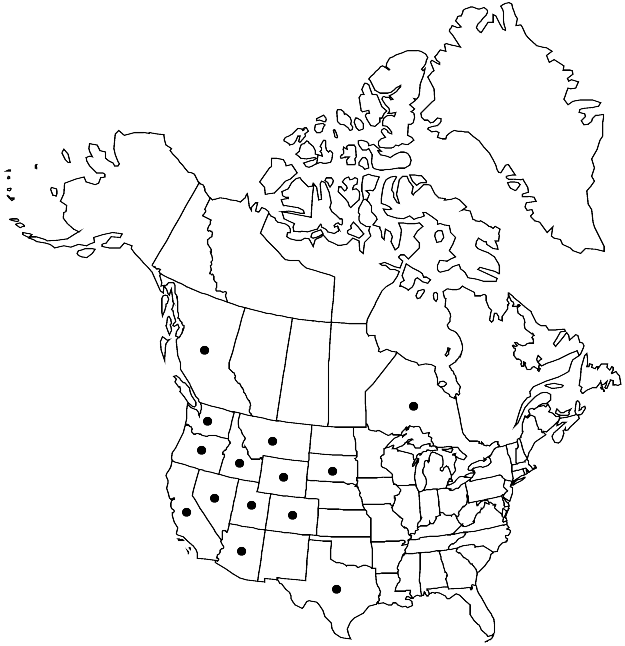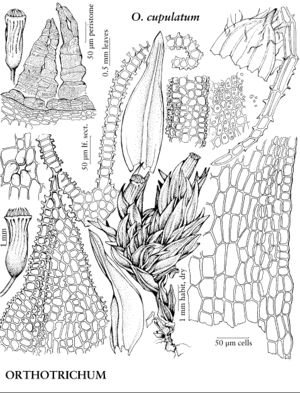Difference between revisions of "Orthotrichum cupulatum"
Muscol. Recent. 2(2): 25. 1801.
FNA>Volume Importer |
imported>Volume Importer |
||
| (6 intermediate revisions by 2 users not shown) | |||
| Line 9: | Line 9: | ||
|special_status={{Treatment/ID/Special_status | |special_status={{Treatment/ID/Special_status | ||
|code=F | |code=F | ||
| − | |label= | + | |label=Illustrated |
}} | }} | ||
|basionyms= | |basionyms= | ||
| Line 15: | Line 15: | ||
|name=Orthotrichum leiodon | |name=Orthotrichum leiodon | ||
|authority=Kindberg | |authority=Kindberg | ||
| − | }}{{Treatment/ID/Synonym | + | |rank=species |
| + | }} {{Treatment/ID/Synonym | ||
|name=O. utahense | |name=O. utahense | ||
|authority=Lesquereux | |authority=Lesquereux | ||
| + | |rank=species | ||
}} | }} | ||
|hierarchy=Orthotrichaceae;Orthotrichum;Orthotrichum cupulatum | |hierarchy=Orthotrichaceae;Orthotrichum;Orthotrichum cupulatum | ||
| Line 32: | Line 34: | ||
|elevation=low to high elevations (100-3000 m) | |elevation=low to high elevations (100-3000 m) | ||
|distribution=B.C.;Ont.;Ariz.;Calif.;Colo.;Idaho;Mont.;Nev.;Oreg.;S.Dak.;Tex.;Utah;Wash.;Wyo.;Mexico (Nuevo León);Europe;Asia;n Africa. | |distribution=B.C.;Ont.;Ariz.;Calif.;Colo.;Idaho;Mont.;Nev.;Oreg.;S.Dak.;Tex.;Utah;Wash.;Wyo.;Mexico (Nuevo León);Europe;Asia;n Africa. | ||
| − | |discussion=<p>Orthotrichum cupulatum is extremely variable but can be distinguished by: leaves ovate-lanceolate, broadly but sharply acute, and usually 1-stratose or occasionally partially 2-stratose; laminal cell papillae usually large and 2-fid, but if small and conic then the leaf is 1-stratose; leaf margins never thicker than lamina; peristome teeth always 16, erect or spreading, and yellow-brown; and capsule 16-ribbed, sometimes with eight short and eight long ribs. The stomata are found in one or two rows mid capsule.</p> | + | |discussion=<p><i>Orthotrichum cupulatum</i> is extremely variable but can be distinguished by: leaves ovate-lanceolate, broadly but sharply acute, and usually 1-stratose or occasionally partially 2-stratose; laminal cell papillae usually large and 2-fid, but if small and conic then the leaf is 1-stratose; leaf margins never thicker than lamina; peristome teeth always 16, erect or spreading, and yellow-brown; and capsule 16-ribbed, sometimes with eight short and eight long ribs. The stomata are found in one or two rows mid capsule.</p> |
|tables= | |tables= | ||
|references= | |references= | ||
| Line 41: | Line 43: | ||
-->{{#Taxon: | -->{{#Taxon: | ||
name=Orthotrichum cupulatum | name=Orthotrichum cupulatum | ||
| − | |||
|authority=Hoffmann ex Bridel | |authority=Hoffmann ex Bridel | ||
|rank=species | |rank=species | ||
| Line 54: | Line 55: | ||
|publication title=Muscol. Recent. | |publication title=Muscol. Recent. | ||
|publication year=1801 | |publication year=1801 | ||
| − | |special status= | + | |special status=Illustrated |
| − | |source xml=https:// | + | |source xml=https://bitbucket.org/aafc-mbb/fna-data-curation/src/2e0870ddd59836b60bcf96646a41e87ea5a5943a/coarse_grained_fna_xml/V28/V28_64.xml |
|genus=Orthotrichum | |genus=Orthotrichum | ||
|species=Orthotrichum cupulatum | |species=Orthotrichum cupulatum | ||
Latest revision as of 21:37, 5 November 2020
Plants to 1.2 cm. Stem leaves erect-appressed when dry, ovate-lanceolate to oblong-lanceolate, 2.5–4 mm; margins recurved or revolute to near apex, entire; apex acute or rarely narrowly obtuse; basal laminal cells long- to short-rectangular, walls thin, not nodose; distal cells 8–12 µm, 1-stratose, rarely 2-stratose in streaks, papillae 2 or 3 per cell, 2-fid and large, or sometimes conic and small. Specialized asexual reproduction absent. Sexual condition gonioautoicous. Seta 0.5–1 mm. Capsule immersed to 1/2 emergent when dry, ovate, 1.2–1.6 mm, 16-ribbed, constricted below mouth when dry; stomata immersed; peristome single, rarely double; prostome usually present; exostome teeth 16, usually absent when capsule is old, erect, spreading-reflexed with age, papillose-striate or papillose-reticulate; endostome segments absent or rarely 8, not well developed, of 1 row of cells, short, smooth. Calyptra oblong to oblong-conic, smooth, hairy, hairs papillose. Spores 9–16 µm.
Habitat: Calcareous and large boulders in coniferous forests, dry areas of Pinus ponderosa forests, dry cliff faces in canyons
Elevation: low to high elevations (100-3000 m)
Distribution

B.C., Ont., Ariz., Calif., Colo., Idaho, Mont., Nev., Oreg., S.Dak., Tex., Utah, Wash., Wyo., Mexico (Nuevo León), Europe, Asia, n Africa.
Discussion
Orthotrichum cupulatum is extremely variable but can be distinguished by: leaves ovate-lanceolate, broadly but sharply acute, and usually 1-stratose or occasionally partially 2-stratose; laminal cell papillae usually large and 2-fid, but if small and conic then the leaf is 1-stratose; leaf margins never thicker than lamina; peristome teeth always 16, erect or spreading, and yellow-brown; and capsule 16-ribbed, sometimes with eight short and eight long ribs. The stomata are found in one or two rows mid capsule.
Selected References
None.
